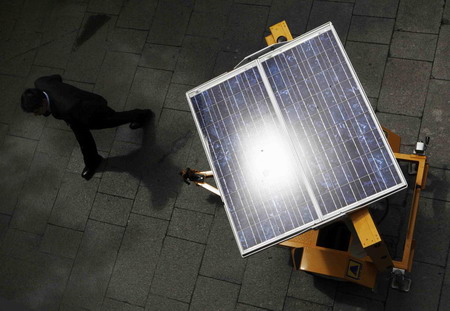Global General
Australian Senate rejects carbon-trade bill
(Agencies)
Updated: 2009-12-02 11:27
|
 A commuter walks past a solar powered traffic sign in central Sydney December 1, 2009.?[Agencies] |
SYDNEY: Australia's Parliament defeated legislation to set up a greenhouse gas emissions trading system on Wednesday, throwing a central plank of the government's plans to combat global warming into disarray.
The Senate, where Prime Minister Kevin Rudd's government does not hold a majority, rejected his administration's proposal for Australia to become one of the first countries to install a so-called cap-and-trade system to slash the amount of heat-trapping pollution that industries pump into the air.
Rudd had wanted the legislation passed before he attends next week's UN summit on climate change in Copenhagen so he could portray Australia as a world leader on the issue.
The government's next step is unclear. Rudd could use the failure of the bill to call early elections, but is unlikely to do so before next year, when elections are due anyway.
Australia is a small greenhouse gas polluter in global terms, but one of the worst per capita because it relies heavily for its electricity on its abundant reserves of coal, which also make it the world's largest exporter of the polluting fuel. As the driest continent after Antarctica, it is also considered one of the most vulnerable countries to climate change.
The European Union has a carbon trading system, as do some US states. Canada and New Zealand are among countries considering or in the process of implementing them.
Under the government's plan, an annual limit would be placed on the amount of greenhouse gases allowed to be pumped into the atmosphere and permits would be issued to regulate that ceiling. The permits could be bought and sold, setting up a market system that would make reducing emissions potentially profitable for polluting companies.
Opponents of the legislation say it amounts to a huge new tax on polluting industries such as power generators, which would put a crimp on the economy and lead to higher prices for consumers. Such costs would have no effect on the level of global greenhouse gas emissions, they say.
Climate Change Minister Sen. Penny Wong accused the opposition members who voted the bill down of being climate change deniers out of step with the world.
"This is about doing our bit as part of a global agreement, this is about responding to what is a global challenge. This nation, too, has to act," Wong told the Senate. "You have to make polluters pay. If you do not make polluters pay you will not tackle climate change."











